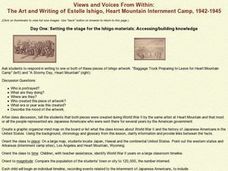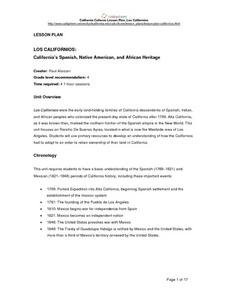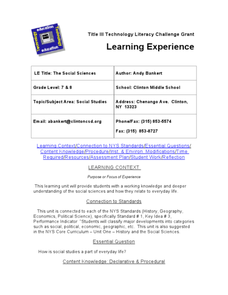Curated OER
The Art and Writing of Estelle Ishigo, Heart Mountain Internment Camp, 1942-1945
Students view images of the Heart Mountain Internment Camp created by Estelle Ishigo. They discuss the time and place portrayed in the images and create a timeline recording events related to the internment of Japanese Americans.
Curated OER
Vietnam: A Divided Nation
Eleventh graders examine events leading up to and during the Vietnam War. They research assigned topics utilizing interviews, Powerpoint presentations, timelines, and collages in their presentations.
Curated OER
Having Fun with Primary Sources
Young scholars analyze primary sources to determine the effects of the Great Depression on American society. They evaluate how government expanded during this time period because of New Deal legislation.
Curated OER
The Study of the Spanish-Speaking People of Texas: Immigration
Students identify the meaning of the following terms: immigrant, immigration, migrate, and assimilation. They identify reasons that immigrant groups came to Texas and explain where groups settle and the influence these groups have on...
Curated OER
Milton Hershey and His Times
Students explore the accomplishments of Milton Hershey. In this historical analysis lesson, students research Hershey's life and the historical events that occurred during his life. Students create timelines that feature both sets of...
Curated OER
Los Californios
Fourth graders research the culture of Los Californios through primary sources. They examine maps and draw timelines of California historical dates. They investigate deeds and s of ranches and simulate property transactions.
Curated OER
All About Me Museum
Students investigate the concept of self-esteem and image with the creation of a personal display of items of significance. They put together a project composed of pictures and writings to describe themselves and are assessed according...
Curated OER
Cave Paintings: Studying the Past
Middle schoolers are introduced to prehistoric paintings with the cave art at Lascaux and Altamira. They, in groups, role-play the members of a clan and design appropriate cave paintings for their group.
Curated OER
The Social Sciences
Students search for examples of social science in and around their school. They create a Social Science scrapbook of the eight social sciences, that includes news articles and summaries that focus on each social science area.
Curated OER
The Chernobyl Accident
Fifth graders see that the Chernobyl Accident of 1986 was caused by a poorly developed experiment in a nuclear power plant. They explain the purpose of a nuclear power plant and determine the health effects that radioactivity causes.
Curated OER
Living on a Cotton Farm: Mexican Americans Life In Texas
Seventh graders are introduced to the processes of cotton farming in the early 20th century. In groups, they examine the role of Mexican Americans on the farms and the impact of a boom and bust economy on cotton. They identify the...
Curated OER
Invention Timeline
In this lesson, high schoolers Create a timeline of historical events, Identify patterns of change, Interpret data in a timeline.In this lesson, students use Inspiration to view progress over time as they develop
timelines highlighting...
Curated OER
What Drives Immigration?
Students research the primary causes of emigration and examine the affects of immigration on a country. They conduct research either individually or as a group and prepare a written report or dramatic presentation of their findings.
Curated OER
Lesson 1: Powerless?
Pupils formulate interview questions based on the information they learn from the video Power Lines. They conduct an interview with a relative, friend, or community member over 60 years old.
Curated OER
Exhibiting Your Knowledge
Students are introduced to the various museum functions. In groups, they create a traveling exhibition based on Gutenberg's invention and the first printed book. They share their exhibition with the class and answer any questions presented.
Curated OER
The Great Depression WebQuest
Tenth graders explore the events of the Great Depression. They analyze the events and select those most important to contemporary people and the future of the nation. Students create a PowerPoint presentation over the Great Depression.
Curated OER
Transportation and Communication Timeline
Students discuss the growth of transportation and communication technology since 1500 C.E. Individually or in groups, they research lists of developments in the two areas. Finally, students create timelines indicating the development...
Curated OER
Ancient Egypt: Domestic Life: Bartering
In this ancient Egypt worksheet, students read about bartering in the marketplace. Students find the value of 4 items and draw the things you could barter them for.
Curated OER
Exercise for Writing a Summary Paragraph
Students examine how to write article summaries of abstracts. In this writing skills lesson, students edit the noted sections of an abstract that is already written on the Old Testament Abstracts.
Curated OER
My Holiday Portfolio
Students create a holiday portfolio by participating in these three lessons. They experience using the computer by using the provided student guides.
Curated OER
Testing the Hypothesis
Students create and conduct various experiments to determine the origin of a family artifact, and then determine whether their results were successful. Students summarize their results and evaluate whether their hypotheses were correct.






















